#justice || akechi
Text
@silver-strings-of-fate [post-canon starter call]

Goro missed living in Kichijoji, sometimes. He had never spent much time in his apartment there, and even now it was only a fifteen minute train ride away, but he still missed it.
After the initial scramble, he'd had more time to think in general over the past year or so, which was a double-edged sword. Working only one job, no school or Metaverse missions... it left him with a lot of free time he didn't know what to do with.
He wasn't happy, exactly. But he was living.
[ text -> Ren Amamiya ] Are you free tonight? If so, I'd like to meet up, if it isn't too much of a bother.
[ text -> Ren Amamiya ] I'll be waiting in the usual place. We can talk more in person.

This is just a courtesy, he told himself, over and over again. He still felt like an idiot, standing here in front of Penguin Sniper and waiting for someone who probably wouldn't even show up, because who in their right mind would even want to see their would-be murderer again?
It had been strange, to text him so casually. Like it hadn't been years since they'd spoken. Like Goro wasn't supposed to be dead. But, well, he needed to let Ren know he was alive at some point, and that wasn't exactly something he could do over text. Especially since he'd panicked right after sending the messages and turned his phone off, so he didn't even know if Ren was coming. If it was even still his number.
Well. If it wasn't, at least Goro had been careful not to give away any identifying information. He'd just have to wait a little longer.
43 notes
·
View notes
Text

Justice Arcana
Print
5K notes
·
View notes
Text

akechi’s recurring dream
#he is the hero of justice!#my art#apr 2024#persona 5#p5#akechi goro#akechi#art#loser baby#he’s just a child. who murders#i forgot joker is in this#shuake
210 notes
·
View notes
Text
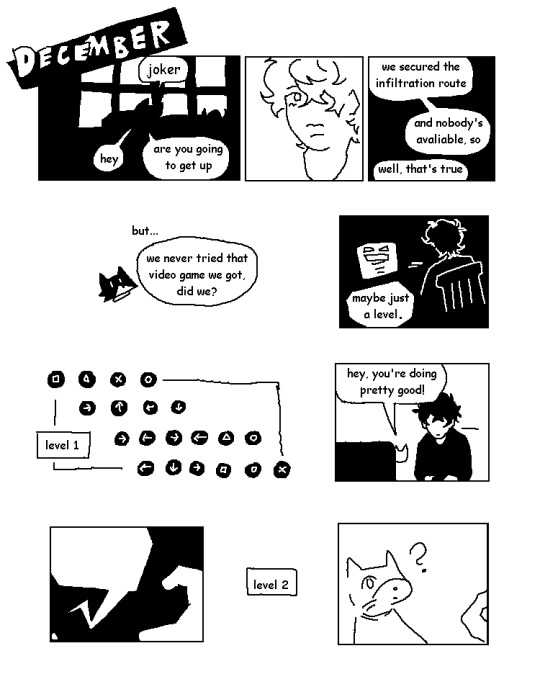
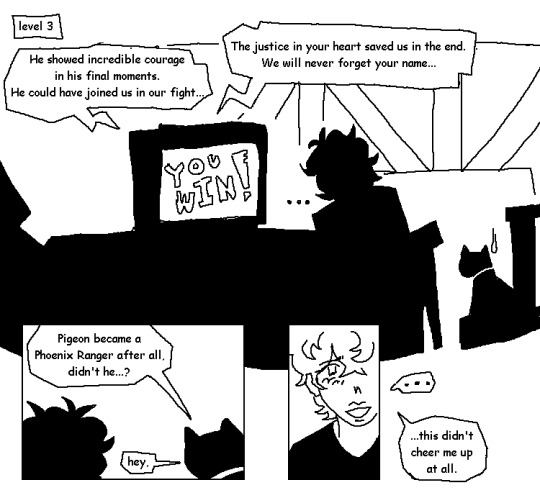
in which his life is like a video game
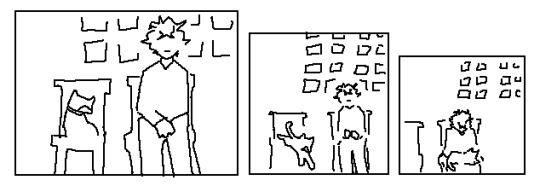
#persona 5#joker p5#morgana p5#akira kurusu#ren amamiya#my art#p5 spoilers#<- i mean. i dont like. say anything outright but like. i feel like i say *enough* in this one. lol#this ones actually pretty old i was just bored and wanted to draw but didnt want to draw enough to do anything serious so i finished it#i almost scrapped it because well it was hard to wrangle and had a minor tone problem but well. they cant all be winners <3#not my best work but i think the concept is. um. kind of really funny. lol#morgana: shit maybe it'll help him a little to play a game. get his mind off recent events. (it does not do this)#i still think this game is the funniest addition to royal. like they went out of their way to add this akechi themed video game in royal#im gonna be real with you. i think the gray pigeon theory thing is kind of silly. but goro akechi featherman parallels r so real. real shit#have you guys seen proof of justice. wasnt that crazy. that was crazy.#anyway. i want a love so strong it'll bring me back from the dead! or however that featherman episode goes. seeya#comics
815 notes
·
View notes
Text
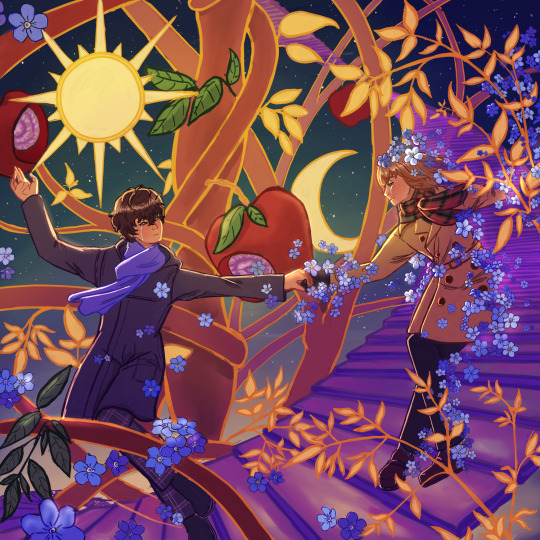
We could dance the tears away,
Emancipate ourselves,
We'll cry later or cry now,
But baby heartbreak feels so good
#persona 5#persona 5 royal#shuake#amamiya ren#akeshu#persona 5 protagonist#akechi goro#goro akechi#my art#artists on tumblr#I have had this art idea for so long and then fob brought out this song giving me a caption for it <3#song is Heartbreak Feels So Good for anyone who doesn't know it btw#Took ages for me to decide I would actually be able to do it justice and start on this and I enjoyed making it so much#I need more angst art ideas if anyone has any lol
600 notes
·
View notes
Text
Read a fanfic that reminded me why i HATE the post shido’s palace scene.
You’re telling me that Ryuji Sakamoto, who has a terrible knee from the abuse of Kamoshida, R A N to be able to save his friends and then came close to being face to face with death AND THEN gets beaten up by his OWN FRIENDS because they thought he died? REMIND YOU HIS ENTIRE LIFE HES BEEN ABUSED BY ONE FIGURE OR ANOTHER, and nothing comes out of it? no repercussions? no apologies from people who know his story and are supposed to be his friends? no thank yous for him literally saving their lives? everything just goes back to normal?
how dare you.
#persona 5#goro akechi#ryuji sakamoto#yusuke kitagawa#akira kusuru#ren amimaya#ann takamaki#haru okumura#futaba sakura#p5 morgana#JUSTICE FOR RYUJI
281 notes
·
View notes
Text
haru: "we'll just take him out again"
Ah, this 1/10 line of Haru's, about what they should do if Akechi betrays them all a second time.
I've talked about Haru and Akechi before—she is overwhelmingly compassionate towards him. She shows him understanding he has not earned and does not deserve. She contrasts, in fact, with Futaba, who takes a consistently harsh tone with him—and well may she do so.
Haru is done dirty by the bulk of the fandom with this flanderised crazy axe mean girl schtick, and this translation does not help. So it's time for another big red....
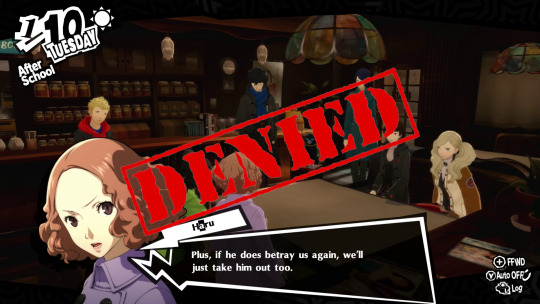
Let's take a look.
tatakau: "to fight or battle"
Haru
また裏切るようなら戦うだけだよ。
mata uragiru you nara tatakau dake da yo
Plus, if he does betray us again, we’ll just take him out too.
mata uragiru you nara—"if he betrays us again, then we'll...". tatakau dake da yo—"we'll just tatakau him". But what's that verb; what's tatakau?
戦う tatakau means to fight, or do battle, or to make war on someone, or to oppose them. It's a common word. ALC has a number of examples:
戦うか逃げるかの反応 tatakau ka nigeru ka no hannou, "fight-or-flight response";
戦うことを諦める tatakau koto o akirameru, "to give up the fight";
戦う必要なく tatakau hitsuyou naku, "without even having to fight".
It is excessively common in P5:
Ryuji (before one of the robot minibosses in Okumura's Palace)
こりゃもう戦うしかねーな!
korya mou tatakau shika nee na!
Looks like we're gonna have to fight.
Haru (when you try to switch her into the party too early)
私も戦えるよ!
watashi mo tatakaeru yo!
I can fight too!
Haru (before a robot miniboss)
こうなったら戦うしか⋯!
kou nattara tatakau shika...!
It looks like we just have to fight!
tatakau is the word we translate as "fight"; "a fight" is often tatakai, from the same root verb. When the PTs fight in the Metaverse, they are tatakau-ing. And when they fought Akechi in the engine room? They tatakau-ed him:
Ann
同じヤツを憎んでるのに、なんで戦うの!?
onaji yatsu o nikunderu no ni, nande tatakau no!?
We both hate the same guy! Why do we have to go against each other!?
Morgana
戦う前に笑ってたの⋯あれ、本心だろ?
tatakau mae ni waratteta no... are, honshin daro?
That smile before we fought… Isn't that how you really feel?
See? Let's look at Haru's line one more time:
Haru
また裏切るようなら戦うだけだよ。
mata uragiru you nara tatakau dake da yo
Plus, if he does betray us again, we’ll just take him out too.
And if he betrays us again, we'll just fight him again.
the phantom thieves' ghost murder victim
The other key point is this: though this isn't present in the Japanese, the localisation still says "too". "we'll just take him out too". Who's that "too"?
They're not killing Maruki, despite Akechi's efforts. They didn't kill any of their targets. They didn't even kill Shido, who they all held responsible for the murder of Haru's father, and Futaba's mother, and who knows how many others.
In short: nobody is getting murdered in this line—except Haru, by the localisation.
"take him out"
In fairness to everyone who fast-forwarded all of Haru's dialogue and so thinks she's even worse than Akechi, cold-bloodedly planning murder as a form of revenge, "take him out" is a confusing choice of words.
"take him out" means to disable a target. This is how it gets its primary meaning of "kill him". It means to get something or someone out of your way, in a way that corresponds with its death or destruction—or, as in this case, with extreme violence; remember they KO Akechi in the engine room, just like every other boss.
This is why it's common in so many contexts—sport, business, politics. You take out targets in many fields, but you don't kill them! In the same way, Haru intends for them to eliminate Akechi as a threat, if he ever makes it necessary again.
Futaba makes this explicit to him the next day, on 1/11:
Futaba
けどまた裏切ったりしたら、絶対許さない。
kedo mata uragittari shitara, zettai yurusanai
BUT if you ever betray us again, we'll make sure you regret it.
Futaba says this right to his face: "if you betray us again, don't think you'll get away with it"; "if you betray us again, you're done for." She tells him this is his one and only chance.
(That zettai yurusanai, of course, is the same wording she uses about the men in black suits, and the men who killed her mother—it's fighting talk, blood debt talk. And it's interesting that she has clearly not yet put Akechi into that category. yurusanai is also the word Haru uses to him in the engine room, often translated as "I can't forgive you".)
context matters
Many common misunderstandings of P5's characters and plot boil down to something like this: an overfocus on one memorable line, at the expense of the bigger picture. Again, in fairness, P5 is a huge game, which makes this very easy to do.
But the fact that the Phantom Thieves have chosen not to kill comes up over and over. It is absolutely fundamental to them: their justice does not include murder.
Again: the fact that they don't go in for vigilante killings is what makes them better than Akechi! Part of the essence of their conflict is that Akechi has made bad choices that the PTs avoided—such as Ann's fateful choice to let Kamoshida live:

Just as with Ann and Kamoshida, I don't think the Thieves would stop Haru or Futaba, if they decided Akechi should die. But I also don't think it would pass without question, as Haru's "take him out" line does. Even if nobody else said a word, Makoto would say something. Because the Phantom Thieves are not murderers.
when someone shows you who they are, believe them
On top of that, if you want to read Haru's "take him out" as meaning she wants Akechi dead, you have to ignore everything else she says about him—and, frankly, every other time she's onscreen. Because Haru oozes kindness, compassion and thoughtfulness from her every pore.
Remember, Haru expresses compassion for Akechi, not hate. Here she is on 12/25:
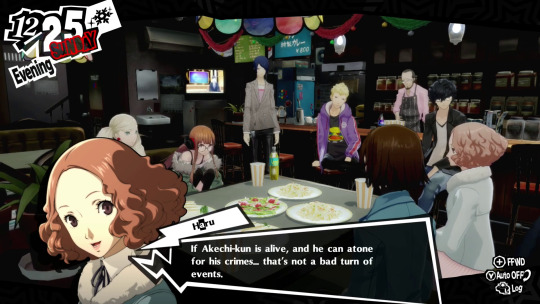
Look at that. Commit it to memory. Show all your friends. Haru is glad Akechi is alive. She's glad he turned himself in and thinks he should pay for his crimes—but she didn't want him dead, and she certainly doesn't want to kill him.
In the engine room, when he's at the point of death, she's afraid for him. She runs forward to call to him; note that Futaba does not, and is at the back of the group, furthest from Akechi.
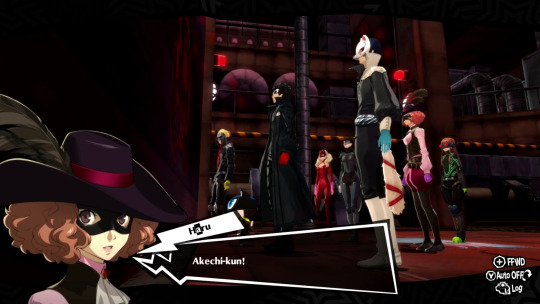
Even when Haru judges Akechi for what he took from her, she is sympathising with him:
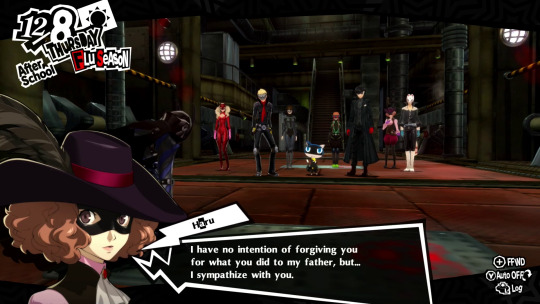
When Cognitive Akechi arrives, Haru isn't just trying to stop Akechi turning on them to save his own skin. She empathises with him, and understands how complex his feelings towards Shido truly are—and why that puts them all in so much danger:
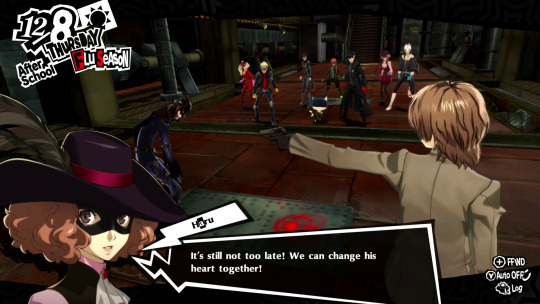

Say it again and say it loud: Haru understands Akechi.
but how does she really feel
Haru tells us her secret feelings in the safe room:
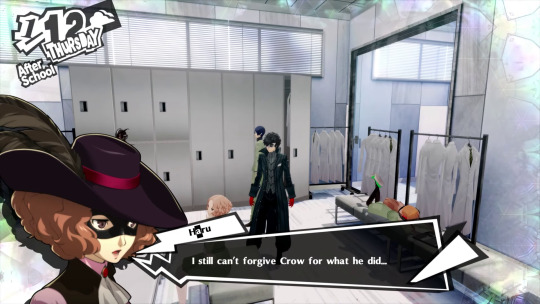

See? Just like Futaba, she doesn't want to be around him; she doesn't want him as part of the group. But she doesn't want to kill him.
That's not her nature. Haru is not a murderer. I'll say it again for the kids at the back: Haru is not a murderer. Her compassion is what makes her unlike Akechi. It's what makes her so much better than him.
She doesn't need to be his best friend to understand him. She doesn't need to hang out with him to see herself in his situation—because the two of them have so much in common. She can acknowledge that he wronged her without secretly (or not-so-secretly) wishing him dead. Haru is a better person than most of us, and her feelings about Akechi are complex.
what is the line actually about?
The sad thing is that Haru's "we'll just take him out" is a beautiful line.
Remember, Haru could be justifiably afraid of the prospect of being around Akechi. He's not safe. He's responsible for one of the greatest traumas of her life. But she shuts that fear down: "if he betrays us again, we'll just fight him again".
She removes his power over her—power to control her, to intimidate her, to make her afraid. Haru can stand up to Akechi and look him in the face, because she's surrounded by her friends. And her friends will stand with her. They prove it over and over in the third semester, when they repeatedly prioritise her feelings and Futaba's. It's made clear repeatedly that if either of them have a problem, Akechi will not be on the team.
So Haru is prepared to work with the scorpion by the river. She understands what made it how it is, and that it can only act according to its nature. But she'll be watching—and she'll be ready. Just like Akechi, who steps forward to fire on Maruki when the rest of them are paralysed.
It's just that Haru's bag of tricks doesn't include murder. Akechi has kept that in his back pocket—but Haru never had it in hers. It's a shame that Haru's clearsightedness here, and her readiness to act—something else she shares with Akechi—is so badly misunderstood as "lol funny murder psycho girl".
Akechi's second betrayal looks like them beating the shit out of him. I'm sure Haru would shoot him in the face a second time, and good luck to her. I'm sure the Phantom Thieves would, each and every one of them, make him deeply regret it before he was again turned in—voluntarily or otherwise.
But murder? No. That's never on the table. That's not Haru, and it's not the Phantom Thieves. And, ultimately, that's why they're the good guys, and Akechi is not.
revision history
Click here for the latest version.
v1.0 (2023/10/13)—first published.
276 notes
·
View notes
Text
How Goro Akechi effectively serves as a dark foil to the Phantom Thieves' brand of rehabilitative justice
So... I understand that Goro Akechi is a pretty divisive character within the Persona 5 fanbase (especially his pre-Royal incarnation), but I have to admit, I honestly found his backstory and role as a sinister foil to Joker and the Phantom Thieves to be legitimately intriguing.
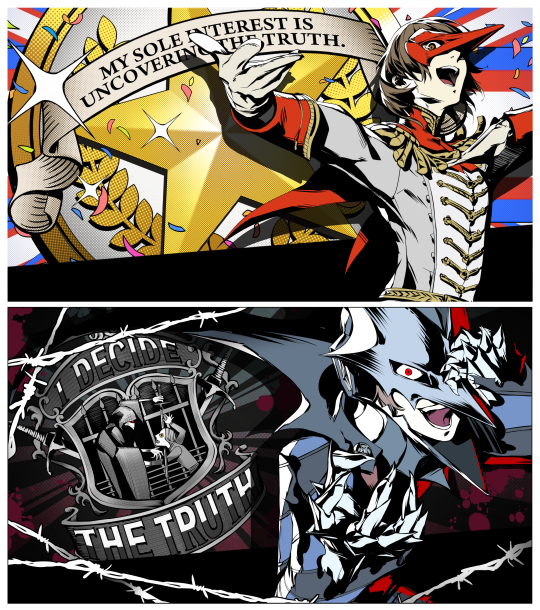
I loved how during the palace mission on the cognitive yacht of the corrupt ultra-nationalist politician, Masayoshi Shido, it is revealed that Akechi is not only the true culprit behind the mysterious wave of mental shutdowns & psychotic breakdowns that have occurred throughout the background of the entire game (including the deaths of both Futaba’s mother, Wakaba Isshiki, and Haru’s father, Kunikazu Okumura) but that he is actually Shido's illegitimate child!
Essentially, Akechi was the product of a dubious affair between Shido and a sex worker whom the former later discarded when he discovered that she was pregnant, driving her to depression and suicide shortly after Akechi's birth. Akechi spent his entire childhood being passed around as a “problem child” between various foster homes (highlighting Japan’s problems with how the country treats its orphaned children) before later being granted the power of the "wildcard" persona as well as knowledge of the Meta-Verse by the false god of control, Yaldabaoth.
While Akechi was a societal outcast similar to the members of the Phantom Thieves, he took the wrong message from his experiences. Akechi misguidedly believes that the only way to truly oppose the status quo that looked down upon him is to not only become a part of it (i.e. caring only about his good grades & celebrity status) but to destroy everything that he hates by reducing himself to Shido's right-hand assassin in the Meta-Verse, perpetuating mental shutdowns & psychotic breakdowns to Shido’s political enemies simply to get some semblance of recognition & validation from his abusive father before exacting revenge on him (whilst exploiting his "ace-detective" celebrity status to "solve" the crimes that he himself committed).

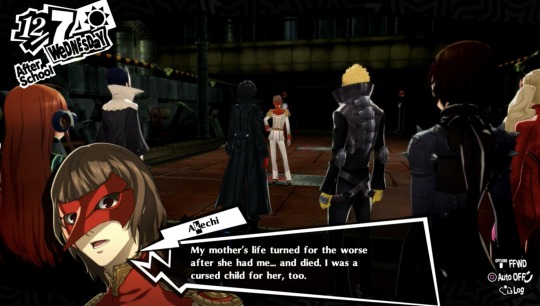
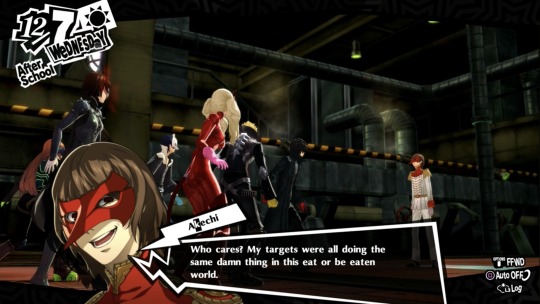


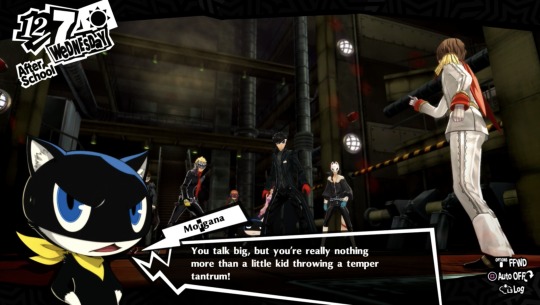
Essentially, once Shido finally became prime minister Akechi planned to whisper the truth about being the former’s illegitimate child, telling Shido that he was only able to get where he was due to the son he abandoned and labeled as a potential “political scandal” before murdering him.
Despite Akechi and the Phantom Thieves' mutual dislike of Shido however, Akechi is so fixated on vengeance that he does not care about the innocent lives he ruins and destroys in the crossfire to satisfy his own personal bloodlust. Instead of legitimately trying to reform society like the Phantom Thieves do, Akechi becomes a pawn of the very same systemic corruption that was responsible for his initial suffering. Akechi cares only about his own hatred & jealousy instead of empathizing with others who were also victimized by society’s ills. That is why when Joker has his rematch with Akechi on Shido's Yacht in the meta-verse, the two are visually juxtaposed between Joker standing strong alongside his teammates & friends, while Akechi remains alone, confused & angry. While there is a part of Akechi that regrets his horrible actions and even recognizes the potential for him & Joker to be friends due to their similar backgrounds, he's too far gone into his obsessive vendetta against Shido that he refuses to turn back and now desires to kill the Phantom Thieves in a misguided attempt to ease his internal conflict.





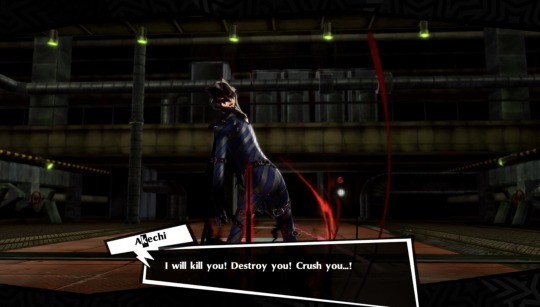
During the boss fight with Akechi in Shido's Palace, the detective prince repeatedly dismisses the Phantom Thieves' efforts to appeal to his common senses, believing that concepts like friendship and teamwork are foolish "cliched bullish*t... in this eat or be eaten world." While this attitude of Akechi's might seem unrealistically cartoonish on the surface, it actually makes sense when considering his background of being unfairly labeled as a "throw-away child" by Japan's foster care institutions. YouTuber LadyVirgilia goes into far greater detail about this in her excellent The Truth About Goro Akechi analysis video. There, she states that an overwhelming number of Japanese orphans are incapable of being legally adopted due to impoverished parents voluntarily relinquishing them from their care while still maintaining legal guardianship over them. Additionally, LadyVirgilia discusses how violent hierarchical power structures often form among the children within these foster homes, with younger orphans sadly being subject to bullying & abuse by their older peers.
While these facts are not explicitly stated about Akechi's backstory within P5 Royal itself, they can easily be heavily inferred due to the game's heavy emphasis on exploring themes related to Japanese sociocultural issues. The institutional failings of Japan's foster care system (combined with Shido's abandonment of his son while he was still in the womb), ultimately contributed to the development of Akechi's warped perception of the rest of the world. Due to being dismissed as a "throw-away child" and being forced to grow up in an institution that is unfortunately subject to high rates of systemic abuse & neglect, Akechi spent his entire life feeling unwanted & loved. Ideals such as friendship & companionship became foreign and unrealistic concepts to him due to having experienced nothing but society's cold & uncaring apathy. Consequently, Akechi became deeply jealous & hateful toward the rest of the world, misguidedly compelling him to want to prove his superiority over the rest of society by manufacturing his status as "the celebrity ace-detective and honors student who ultimately brought down Shido." But when Akechi encounters the Phantom Thieves and befriends their leader Joker, he begins to experience his first genuine bond of companionship. While Akechi maintains a legitimate appreciation toward Joker, he is simultaneously confused & unable to fully process these newfound feelings, becoming envious of Joker's ability to rise above his similar status as a societal outcast to befriend & protect others like himself. Consequently, Akechi projects his own failings & inability to legitimately rise above his tragic upbringing beyond his false celebrity status onto Joker & the Phantom Thieves, cruely dismissing them as "the trash of society" and blaming them for interfering with his revenge plot against Shido.
This empty & hollow existence that Akechi chooses to live is further reflected by the sole two personas that he utilizes during his boss fight: Robin Hood, who represents Akechi's false celebrity & law-abiding gentleman facade, and Loki, who embodies Akechi’s true personality as a deceitful trickster & psychotic murderer.
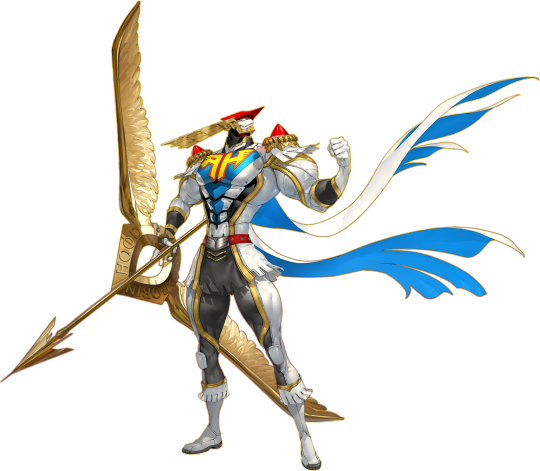
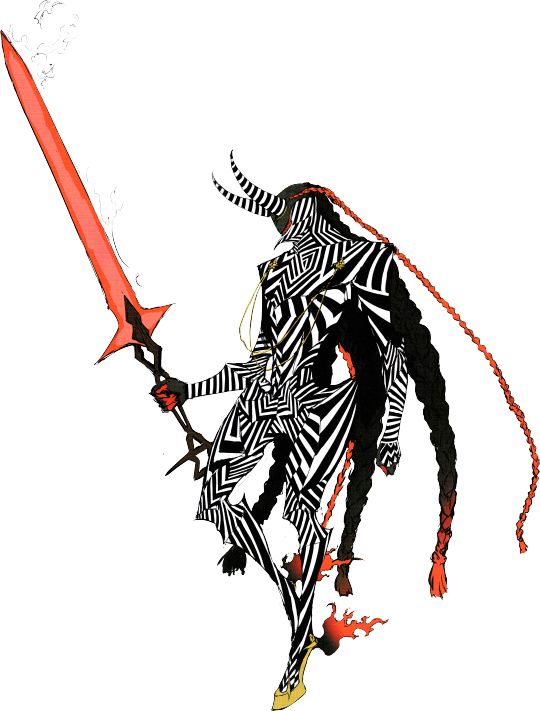
I personally couldn’t help but find all of these elements to be rather interesting & insightful about Akechi’s role as an antagonist/rival to the Phantom Thieves. It honestly highlights the tragic nature of Akechi's situation, since while he had the potential to utilize his deductive knowledge & skills as a "wildcard" Persona-user similar to Joker, he instead allowed himself to be consumed by his own hatred & madness. In contrast, while Joker was also abused by Shido by being wrongfully sued for “assault” when he tried to stop Shido from sexually harassing a random woman, Joker now fights against the systems of authority that criminals like Shido represent to prevent similar abuses of power from ever occurring again to others. Additionally, we also see dualistic parallels between Akechi and Joker's fellow Phantom Thief/potential-romantic partner, Makoto Nijima, since she too similarly previously fell prey to the misconception that “good grades and following orders are all that truly matters to be a worthwhile member of society.” However, Makoto, now utilizes her study skills to help the downtrodden & oppressed instead of for either her own benefit or because it’s what society expects from her, whereas Akechi exploits his false celebrity detective status to further his self-centered vendetta, innocent lives be damned.
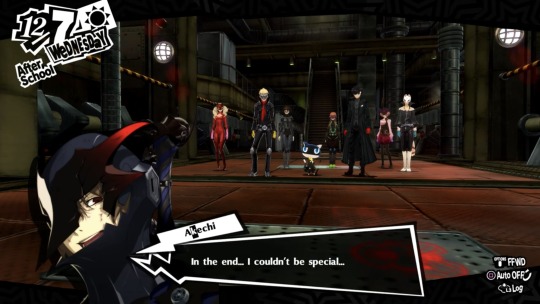
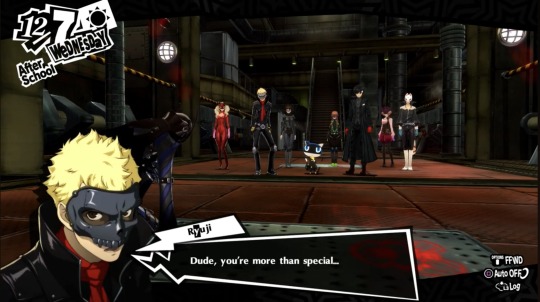
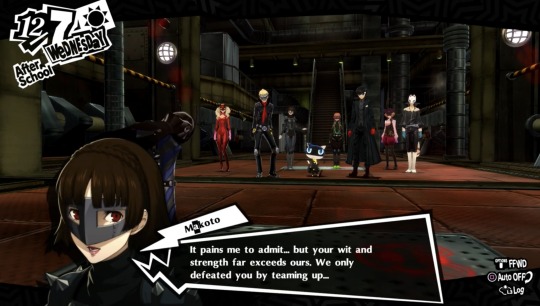
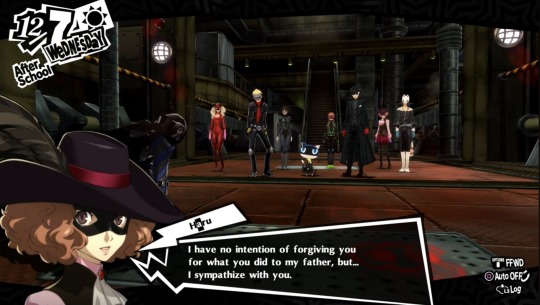
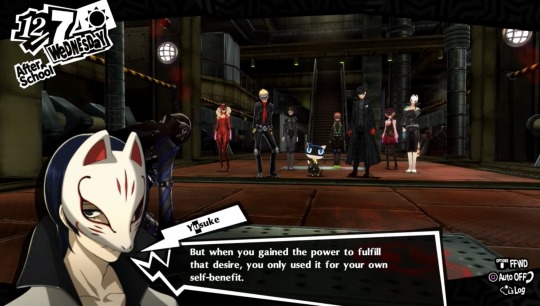
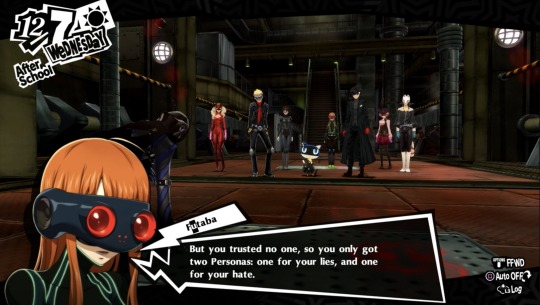
In essence, if the Phantom Thieves embody the potential benefits of rehabilitative justice then Goro Akechi embodies the dangers of retributive justice (aka, revenge). To reference two of my favorite movies, Batman Begins and Star Wars Episode VIII: The Last Jedi, not only is there a strong difference between justice and revenge (one is about altruistic harmony whereas the other is about personal satisfaction), but the most surefire way to victory is by fighting to protect what you love rather than fighting to destroy what you hate...

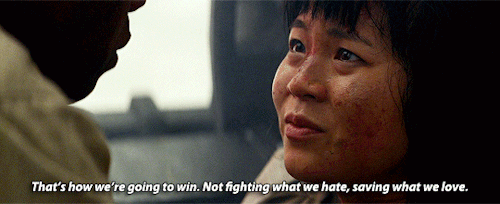
The distinction between justice & revenge is made abundantly clear at the end of Akechi's storyline in the baseline game (i.e. before the Royal exclusive Third Semester new content), where following his defeat at the hands of the Phantom Thieves Akechi is suddenly approached by a cognitive duplicate of himself that dwells within Shido's palace. In addition to the Cognitive Akechi emphasizing the futility of Akechi's quest for acknowledgment & vengeance against Shido by revealing that the latter always intended to dispose of his right-hand assassin once he was elected prime minister, the cognitive duplicate also reveals the true depths of Shido's depravity when he states that he only ever viewed Akechi as a puppet to fulfill his own ambitions. While it is true that Akechi was so obsessed with revenge that he allowed himself to become a pawn of the corrupt status quo, it is exceptionally cruel to learn that this is how Shido has always viewed his own son (which is further punctuated by Shido later revealing to the Phantom Thieves that he secretly always suspected that Akechi was his illegitimate child due to how much he reminded him of his mother). It is this revelation in particular that allows the Phantom Thieves to better empathize with Akechi's tragic upbringing & circumstances. Even though they still seek to hold Akechi accountable for the murders that he committed at Shido's behest, the Phantom Thieves simultaneously recognize that in a sense, Akechi was also a victim of both Shido's cruelty and the systemic injustices of larger Japanese society.
This effectively culminates in the bittersweet resolution to Akechi's storyline in the base Persona 5 game. When the Cognitive Akechi duplicate offers his real-world counterpart one last chance to "redeem" himself in Shido's eyes by killing the Phantom Thieves in his stead, Akechi for the first time in his life decides to be his own person instead of being defined by the labels Shido and society had imposed upon him since birth. Choosing to no longer be a puppet of Shido's corrupt machinations, Akechi rejects his cognitive duplicate's hollow offer by instead turning his gun on the duplicate and his Shadow minions before sealing the engine room's watertight doors between himself and the Phantom Thieves. At the very end, Akechi was finally able to acknowledge that his desire for false appreciation from both his abusive father and larger society was ultimately worthless. Akechi ultimately sacrifices himself to allow the Phantom Thieves to escape, recognizing their true justice while entrusting them to do what he was incapable of by holding Shido accountable for his crimes & reforming society.
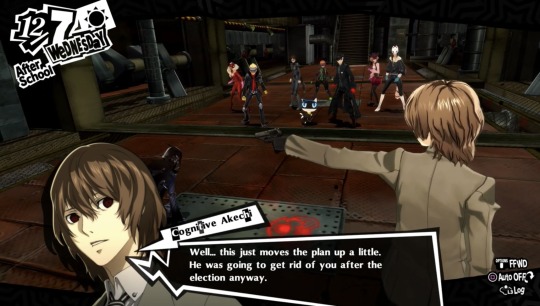

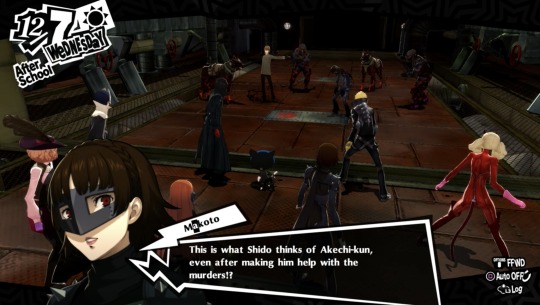

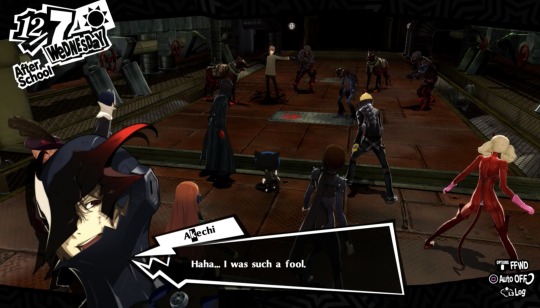
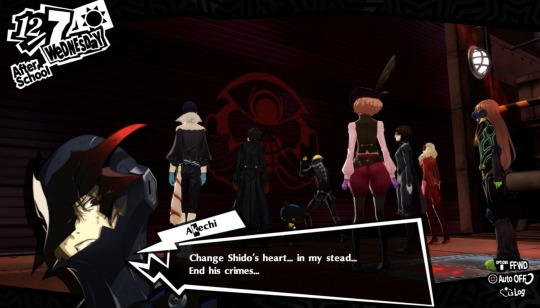
From a certain point of view, one could argue that the Phantom Thieves indirectly inspired a change of heart in Akechi by proving to him the validity of their sense of justice.
Overall, while I was initially indifferent towards Goro Akechi at the start of my playthrough of Persona 5 (and even outright skeptical & suspicious of his motives given his vocal opposition to the Phantom Thieves), by the time I got to his boss battle in Shido's palace I ended gained a deeper understanding and appreciation for what the developers at Atlus were attempting to convey with his character. Akechi effectively functions as both a cautionary tale about the dangers of allowing oneself to be consumed with thoughts of revenge, as well as a dark parallel to the Phantom Thieves who seek to legitimately reform society for altruistic rather than self-centered reasons. It was these elements that ultimately elevated Akechi into becoming one of my personal favorite members of P5's cast (right behind Makoto, Futaba & Ann...) from both a narrative and character writing perspective (especially with the Royal edition's overhauled confidant line for Akechi, which better fleshes out the latter's rivalry with Joker, and the player now has to progress manually instead of it being automatic)! And I am definitely curious to see how Royal's exclusive "Third Semester" content further fleshes out Akechi's character since I'm aware that he plays a major role in the new story content.
#persona 5 royal#p5 royal#persona 5#goro akechi#crow#black mask#robin hood#loki#masayoshi shido#phantom thieves#p5 joker#p5 protagonist#ren amamiya#makoto niijima#ann takamaki#ryuji sakamoto#morgana#yusuke kitagawa#futaba sakura#haru okumura#batman begins#the last jedi#justice vs revenge#rehabilitative justice#atlus games#video games#mini essay#Youtube
113 notes
·
View notes
Text
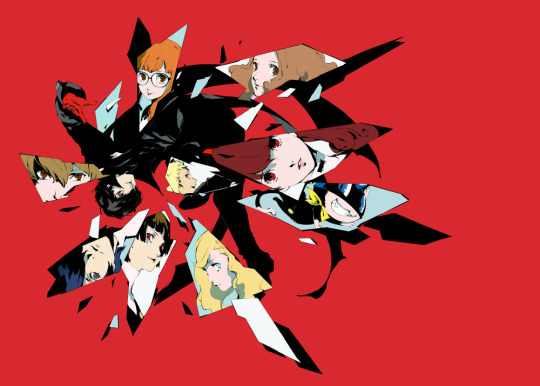
#Official art#Persona 5 Royal#Goro Akechi#Justice Arcanum#phantom thieves#persona users#Sumire Yoshizawa#Yusuke Kitagawa#ren amamiya/joker/akira kurusu#Ryuji Sakamoto#Ann Takamaki#morgana(persona 5)#Haru Okumura#Makoto Niijima#Futaba Sakura#Erica Lindbeck#Erika Harlatcher-Stone#Laura Post#Matthew Mercer#Xander Mobus#Robbie Daymond#Max Mittleman#Xanthe Huynh#Cassandra Lee Morris#Cherami Leigh
343 notes
·
View notes
Text
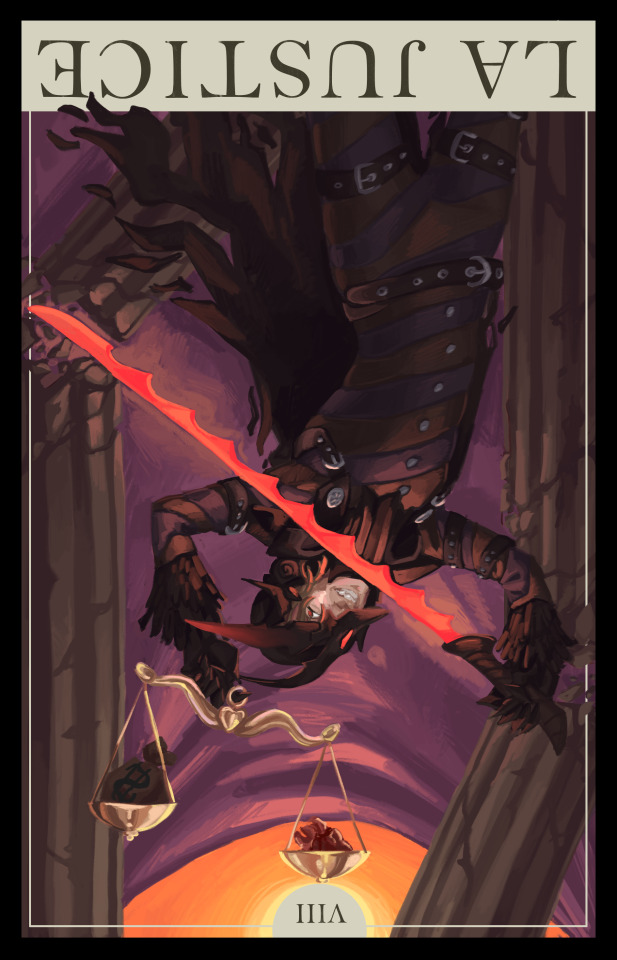
viii. justice - reversed: unfairness, lack of accountability, dishonesty
598 notes
·
View notes
Photo
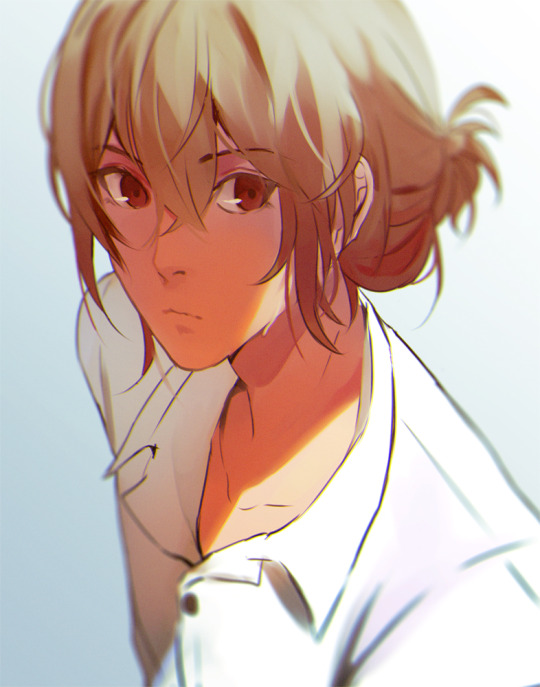
749 notes
·
View notes
Text
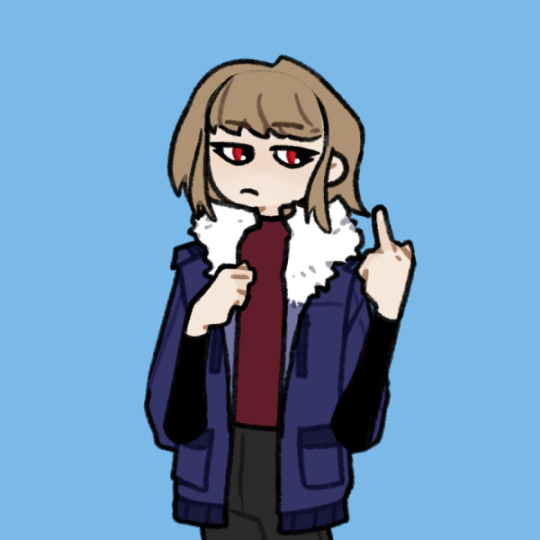
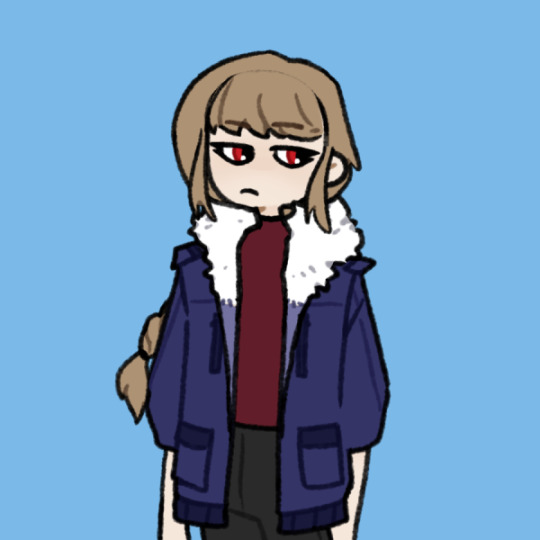
variations on a post-canon design i've been playing around with
9 notes
·
View notes
Text
I hope whoever the justice arcana is in p6 continues the tradition of absolutely fucking me up with their relationship towards the protagonist and their backstory (and maybe also has a dead mom)
#og#it’s a trope I LOVE BRING ON TJE JUSTICE ARCANA WITH THE DEAD MOM BABEY#and at least three of them have a lousy dad#persona 4#persona 5#persona 3#persona 2#katsuya suou#nanako dojima#ken amada#goro akechi#justice arcana#justice posting#persona 6
217 notes
·
View notes
Text
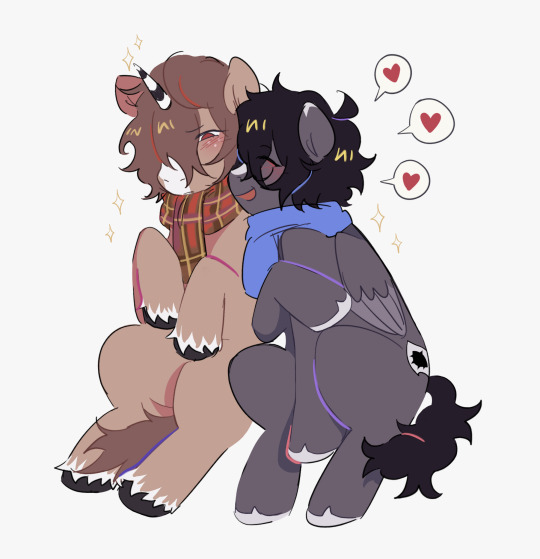
finally drew my shuake ponies again
#you are not allowed to make fun of me btw.#squeak squeak#persona 5#goro akechi#akira kurusu#shuake#synthesis#my little pony#btw goro's cutiemark is the. justice symbol. yknow the scale#akira's is his mask but you can see that one here#my art improved so much from the last time i drew them in 2022 :) yippie
223 notes
·
View notes
Text

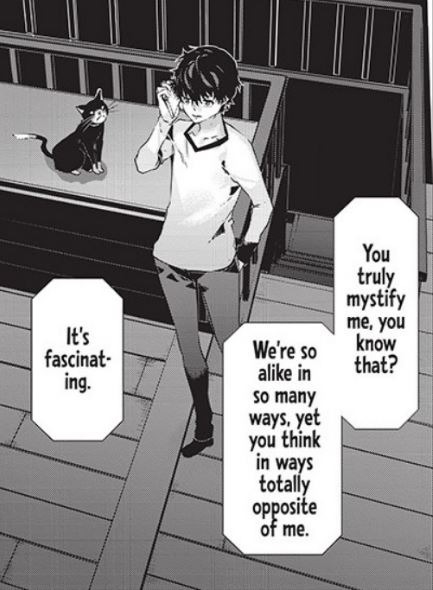
So... *CLEARS THROAT* about that new chapter in the official P5 manga...
#The manga is now going through the gay P5 Royal route#Joker's name is Akira in this manga btw#shuake#akeshu#manga#persona 5#p5#p5 manga#goro akechi#ren amamiya#akira kurusu#justice confidant#p5 royal#p5r
181 notes
·
View notes
Text
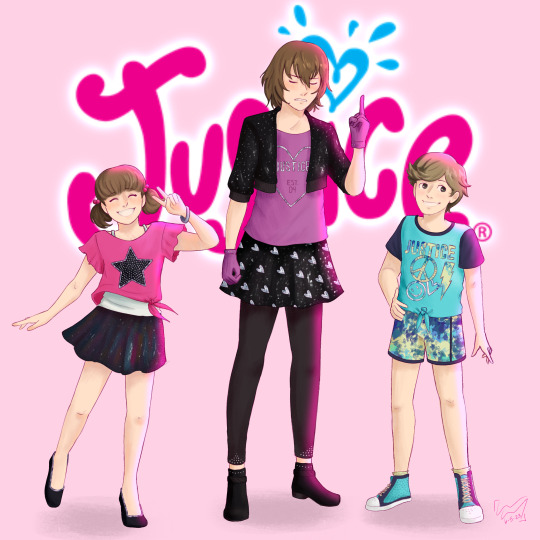
✨ justice ✨
persona 5 (spoiler!) shitpost below the cut!!
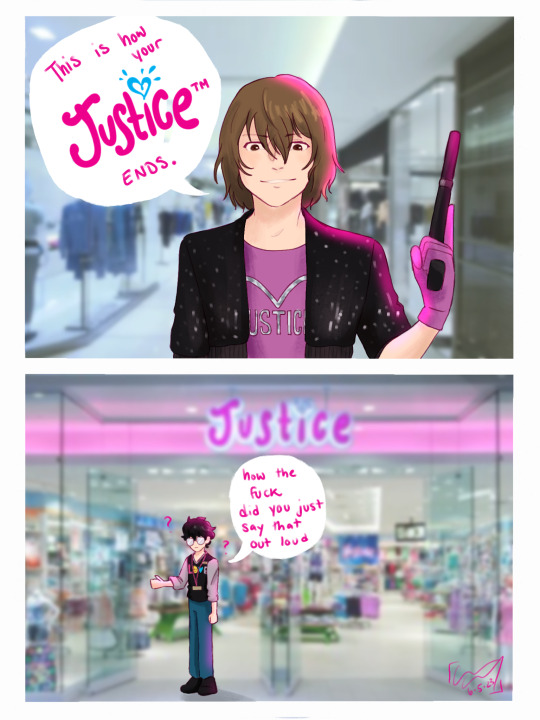
#persona#persona 5#persona 4#persona 3#oof my art i guess#goro akechi#nanako dojima#ken amada#yes justice arcana slayyyy#in the first image akira is just off screen#oh speaking of which#akira kurusu#in my brain katsuya p2 is the manager of justice I just know nothing abt him so he is not in this drawing as of yet#this idea has been plaguing me for WEEKS and is by far the stupidest thing I’ve ever drawn#cars au included (affectionate)#I have another Cursed drawing in my brain that I may unleash upon the world soon but we’ll see#anyways take this it took me much longer than it should have by all accounts#it’s so fuckin late goodnight y’all#would like to note that this came about bc me and my partner are dead certain that every single persona character#is either a hot topic girlie or a justice girlie#and we have them all mapped out ahskjskskalsla#goro shops at justice purely bc the store is named justice
242 notes
·
View notes